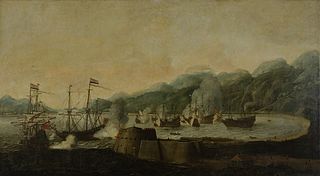 W
WThe Action of 30 September 1639 was a naval battle near Mormugão, just south of Goa, India, when a squadron of 9 Dutch ships captured and destroyed 3 Portuguese galleons.
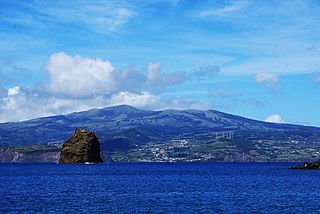 W
WThe Action of Faial or the Battle of Faial Island was a naval engagement that took place on 22–23 June 1594 during the Anglo-Spanish War in which the large and rich 2,000 ton Portuguese carrack Cinco Chagas was destroyed by an English fleet after a long and bitter battle off Faial Island in the Azores. The carrack, which was reputedly one of the richest ever to set sail from the Indies, was lost in an explosion which denied the English, as well as the Portuguese and Spanish, the riches.
 W
WThe Second Battle of Algeciras was a naval battle fought on the night of 12 July 1801 between a squadron of British Royal Navy ships of the line and a larger squadron of ships from the Spanish Navy and French Navy in the Gut of Gibraltar.
 W
WThe Battle of 4 May was fought in open sea near Salvador, Bahia, on 4 May 1823, between the Brazilian Navy, under the command of a former admiral of the British Royal Navy, Thomas Cochrane, and the Portuguese Navy during the Brazilian War of Independence.
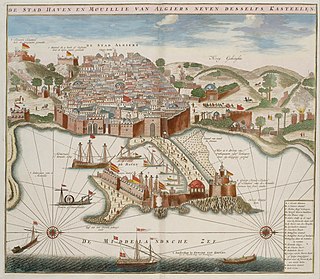 W
WThe 2nd Bombardment of Algiers took place between 12 and 21 July 1784. A joint Spanish-Neapolitan-Maltese-Portuguese fleet commanded by the experienced Spanish Admiral Antonio Barceló bombarded the city, which was the main base of the Barbary corsairs, with the aim of forcing them to interrupt their activities. Massive damage and casualties were inflicted to the Algerians, while the loss aboard the allied fleet was low. The Dey of Algiers refused to start negotiations immediately but the fear of a third planned expedition under José de Mazarredo convinced him to negotiate a peace with the Spanish by which he was forced to cease large-scale piracy, signalling the effective end of the Barbary privateering until the outbreak of the Napoleonic Wars.
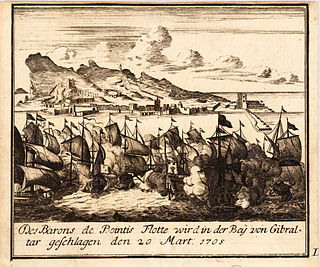 W
WThe Battle of Cabrita Point, sometimes referred to as the Battle of Marbella, was a naval battle that took place while a combined Spanish-French force besieged Gibraltar on 10 March 1705 during the War of Spanish Succession.
 W
WThe Battle of Cape Rachado, off the present day Malaccan exclave of Cape Rachado in 1606, was an important naval engagement between the Dutch East India Company and Portuguese fleets.
 W
WThe Battle of Chaul was a naval battle between the Portuguese and an Egyptian Mamluk fleet in 1508 in the harbour of Chaul in India. The battle ended in a Mamluk victory. It followed the Siege of Cannanore in which a Portuguese garrison successfully resisted an attack by Southern Indian rulers. This was the first Portuguese defeat at sea in the Indian Ocean.
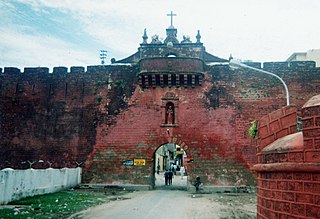 W
WThe Battle of Diu was a naval battle fought on 3 February 1509 in the Arabian Sea, in the port of Diu, India, between the Portuguese Empire and a joint fleet of the Sultan of Gujarat, the Mamlûk Burji Sultanate of Egypt, and the Zamorin of Calicut with support of the Republic of Venice and the Ottoman Empire.
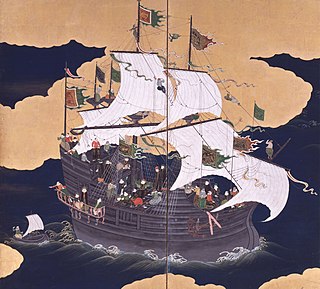 W
WThe Battle of Fukuda Bay in 1565 was the first recorded naval battle between Europeans and the Japanese. A flotilla of samurai under the daimyō Matsura Takanobu attacked two Portuguese trade vessels that had shunned Matsura's port in Hirado and had gone instead to trade at Fukuda, a port belonging to the rival Ōmura Sumitada. The engagement was part of a process of trial and error by the Portuguese traders to find a safe harbour for their carracks in Japan that eventually brought them to Nagasaki.
 W
WThe Battle of Goa refers to a series of naval engagements between the Portuguese Armada and the Dutch East India Company fleets attempting to blockade and conquer the city of Goa. In 1638, forces commanded by the Viceroy of Portuguese India, D. Pedro da Silva and later António Teles de Meneses fought off a large Dutch fleet sent to block the port colony of Goa, commanded by Admiral Adam Westerwolt, who was badly defeated at this encounter. The next year 1639, the Dutch Admiral Cornelis Simonsz van der Veere would conduct a new raid on Goa's port.
 W
WThe Battle of Guinea took place on the Gulf of Guinea, in western Africa, 1478, between a Portuguese fleet and a Castilian fleet in the context of the War of the Castilian Succession.
 W
WThe naval Battle of Matapan took place on 19 July 1717 off the Cape Matapan, on the coast of the Mani Peninsula in southern Greece, between the Armada Grossa of the Republic of Venice, supported by a mixed squadron of allied ships from Portugal, the Papal States and Malta, and the Ottoman fleet, under Kapudan Pasha Eğribozlu İbrahim Pasha.
 W
WThe Nossa Senhora da Graça incident (ノサ・セニョーラ・ダ・グラサ号事件), alternatively called the Madre de Deus incident (マードレ・デ・デウス号事件), was a four-day naval battle between a Portuguese carrack and Japanese samurai junks belonging to the Arima clan near the waters of Nagasaki in 1610. The richly laden "great ship of commerce", famed as the "black ship" by the Japanese, sank after its captain André Pessoa set the gunpowder storage on fire as the vessel was overrun by samurai. This desperate and fatal resistance impressed the Japanese at the time, and memories of the event persisted even into the 19th century.
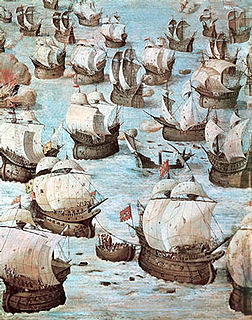 W
WThe naval Battle of Ponta Delgada, Battle of São Miguel or specifically the Battle of Vila Franca do Campo took place on 26 July 1582, off the coast of the island of São Miguel in the Portuguese archipelago of the Azores, during the War of the Portuguese Succession. A combined corsair expedition, mainly French, sailed against a Spanish naval force made up of Portuguese and Castilian ships, to preserve control of the Azores under pretender António, Prior of Crato and to defend the islands from incorporation into the Iberian Union—the largest French force sent overseas before the age of Louis XIV.
 W
WThe Battle of Rio de Janeiro was a raid in September 1711 on the port of Rio de Janeiro in the War of Spanish Succession by a French squadron under René Duguay-Trouin. The Portuguese defenders, including the city's governor and an admiral of the fleet anchored there, were unable to put up effective resistance in spite of numerical advantages.
 W
WThe Battle of the Strait of Hormuz was fought in August 1553 between an Ottoman fleet, commanded by Admiral Murat Reis, against a Portuguese fleet of Dom Diogo de Noronha. The Turks were forced to retreat after clashing with the Portuguese.
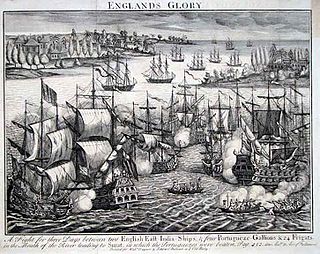 W
WThe naval Battle of Swally, also known as Battle of Suvali, took place on 29–30 November 1612 off the coast of Suvali a village near the Surat city and was a victory for four English East India Company galleons over four Portuguese galleons and 26 barks.
 W
WThe Battle of the Tagus was a naval engagement that took place on 11 July 1831 at the mouth of the Tagus river, in Portugal. A French fleet attacked and subdued Portuguese fortifications at the entrance of the Tagus, with the aim to strong-arm the government of Miguel I into recognising the newly established Kingdom of the French. The damage to the forts defending access to the Tagus and the arrival of French warships at Lisbon forced the Portuguese to cave in and comply with French demands.
 W
WThe Battle of the Gulf of Oman was a naval battle between a large Portuguese armada under Dom Fernando de Meneses and the Ottoman Indian fleet under Seydi Ali Reis. The campaign was a catastrophic failure for the Ottomans who lost all of their ships.
 W
WThe naval Battle of Saltes Island or Battle of Saltes took place on 17 July 1381, off Saltes Island, between the Crown of Castile and the Kingdom of Portugal during the Third Ferdinand War. The Castilian fleet commanded by Don Fernando Sánchez de Tovar defeated decisively the Portuguese fleet led by João Afonso Telo. The result of the battle was the destruction of the naval offensive capability of Portugal, achieving the Castilian naval supremacy in the Atlantic Ocean.
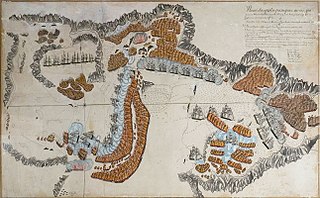 W
WThe Battle of the Tiger's Mouth was a series of engagements between a Portuguese flotilla stationed in Macau, and the Red Flag Fleet of the Chinese pirate Ching Shih, led by her second-in-command, the notorious Cheung Po Tsai - known among the Portuguese as Cam Pau Sai or Quan Apon Chay. Between September 1809 and January 1810, the Red Flag Fleet suffered defeat at the hands of the Portuguese fleet led by José Pinto Alcoforado e Sousa, within the Humen Strait - known to the Portuguese as the Boca do Tigre - until finally surrendering formally in February 1810. As her fleet surrendered, Ching Shih herself abandoned piracy on the occasion.